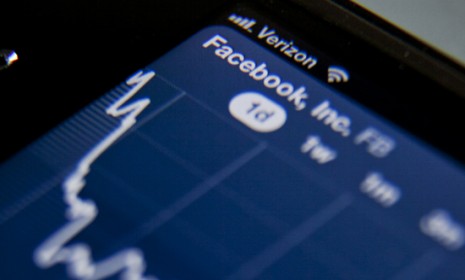5 reasons Facebook's stock is still tanking
There seems to be no end in sight to Facebook's freefall, as investors find a host of new rationales to continue pummeling the social network's share price

A free daily email with the biggest news stories of the day – and the best features from TheWeek.com
You are now subscribed
Your newsletter sign-up was successful
Facebook's share price dipped below $29 for the first time on Tuesday, and remains well below the $38 offering price at which it debuted on May 18. Facebook's continued slide on the stock market has dented optimism that Mark Zuckerberg's addictive social network would claw its way back toward its original price after a series of initial missteps. Here, five reasons Facebook's stock is still in decline:
1. Investors are betting against Facebook
Facebook's stock debuted on the options market on Tuesday, letting investors purchase contracts allowing them to buy or sell the stock at a fixed price in the future. Options contracts essentially enable investors to bet on a stock's direction, and most traders gambled that Facebook's "beaten-down shares have further to fall," say Kaitlyn Kiernan and Jonathan Cheng at The Wall Street Journal. The most highly traded option predicts that Facebook's stock will slip to $25 by mid-July.
The Week
Escape your echo chamber. Get the facts behind the news, plus analysis from multiple perspectives.

Sign up for The Week's Free Newsletters
From our morning news briefing to a weekly Good News Newsletter, get the best of The Week delivered directly to your inbox.
From our morning news briefing to a weekly Good News Newsletter, get the best of The Week delivered directly to your inbox.
2. Expensive buyout rumors are swirling
Rumors emerged over the weekend that Facebook is considering buying Opera Software, a Norwegian software firm that specializes in cellphone internet browsers. Analysts estimated that Opera's price tag could rise to $1 billion with competitive bidding, stoking concerns that Facebook is "eyeing another potentially pricey acquisition" right after buying the revenue-less photo-sharing app Instagram for $1 billion, say Brand Bailey and Jeremy C. Owens at the San Jose Mercury News. And Facebook's alleged flirtation with Opera only underscores its weakness in the smartphone market.
3. Investors are wary of a social media bubble
"Investors are increasingly sensitive to the fleeting nature of social media," and serious questions are being asked about whether Facebook and similar companies can pull in revenue in the future, says Matt Krantz at USA Today. Facebook is not the first tech company to see its share price fall after an IPO: The daily deals site Groupon, the internet radio service Pandora, and online videogame maker Zynga are all getting punished by the stock market.
A free daily email with the biggest news stories of the day – and the best features from TheWeek.com
4. Supply still exceeds demand
Facebook is getting hammered this week for the same reasons that its IPO was marred. The company likely overpriced its stock and sold too many shares, creating a surfeit. Investors are still searching for the correct price, and "Facebook right now does not know where the bottom is," Brian Overby, an analyst at Tradeking, tells The New York Times.
5. The stock market is a circus
This is what happens when you go public, says Kevin Roose at New York. Facebook is now subject to the "short-termism of public investors" and "the carping of the CNBC crowd when stocks fall." Facebook has no choice but to get used to "attacks on the company's corporate governance structure, braying from the peanut gallery about possible acquisitions," and a "flood of awful headline puns about how the markets don't 'like' the company."
-
 Political cartoons for February 16
Political cartoons for February 16Cartoons Monday’s political cartoons include President's Day, a valentine from the Epstein files, and more
-
 Regent Hong Kong: a tranquil haven with a prime waterfront spot
Regent Hong Kong: a tranquil haven with a prime waterfront spotThe Week Recommends The trendy hotel recently underwent an extensive two-year revamp
-
 The problem with diagnosing profound autism
The problem with diagnosing profound autismThe Explainer Experts are reconsidering the idea of autism as a spectrum, which could impact diagnoses and policy making for the condition